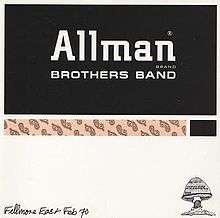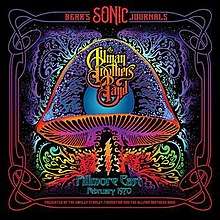Fillmore East, February 1970
Fillmore East, February 1970 is a live album by the rock group the Allman Brothers Band. It was recorded by Owsley Stanley at the Fillmore East in Manhattan on February 11, 13, and 14, 1970. It was released on CD in 1996, and went out of print soon thereafter.
| Fillmore East, February 1970 | ||||
|---|---|---|---|---|
 | ||||
| Live album by | ||||
| Released | 1996 | |||
| Recorded | February 11–14, 1970 | |||
| Genre | Southern rock, Blues-Rock | |||
| Length | 71:20 | |||
| Label | Grateful Dead | |||
| Producer | Owsley Stanley | |||
| The Allman Brothers Band chronology | ||||
| ||||
| Bear's Sonic Journals chronology | ||||
| ||||
| Alternative cover | ||||
 Bear's Sonic Journals: Fillmore East, February 1970 | ||||
In 2018, the album was remastered and rereleased by the Owsley Stanley Foundation, with the title Bear's Sonic Journals: Fillmore East, February 1970. There are two different versions of this release. One contains the same material as the original album. The other is the Deluxe Edition, on three CDs, with two discs of additional music from the same run of concerts.[1][2]
The February 1970 concerts
On February 11, 13, and 14, 1970, the Allman Brothers Band, along with the Grateful Dead and Love, played at Bill Graham's Fillmore East auditorium in New York City. The performances were taped by the Grateful Dead's sound engineer, Owsley ("Bear") Stanley.
Fillmore East, February 1970 is composed of selections from those concerts. The album was produced by Stanley, who also wrote the liner notes. It was mastered by the Dead's recording engineer, Jeffrey Norman. It was released on the Grateful Dead label, in cooperation with the Allman Brothers' record company at the time, PolyGram Records.
Performances by the Grateful Dead from the same set of shows have been released on two albums – Bear's Choice, and Dick's Picks Volume 4.
Critical reception
| Review scores | |
|---|---|
| Source | Rating |
| Allmusic | |
| The Music Box | |
On AllMusic, Lindsay Planer wrote, "There is no mistaking the unbridled fervor of the original line-up of the band. Rising to the challenge of exploratory psychedelia – while remaining ever faithful to their Southern blues roots... Likewise, the Allman Brothers were beginning to ascend as not only premier interpreters, but purveyors of a revolutionary new electric guitar-driven blues movement".[3]
In The Music Box, John Metzger said, "... the disc opens with a scorching rendition of "In Memory of Elizabeth Reed" that simply grooves. Dickey Betts and Duane Allman are magnificent, as they play with reckless abandon, yet tightly in synch. The highlight of this album, however, is the nearly 31-minute "Mountain Jam" that drips with a colorfully electrified intensity."[4]
In Glide Magazine, Doug Collette wrote, "Almost a year after the formation of the seminal Southern rock band... the original sextet was homing in on the sound that would lend itself to At Fillmore East, the epic recordings done thirteen months later at the same venue. Yet even as the group... was honing the influential style that would make them famous, they were stretching themselves as well, shuffling novel and well-established material in and out of their repertoire."[5]
Track listing
Original album
- "In Memory of Elizabeth Reed" (Dickey Betts) – 9:19
- "Hoochie Coochie Man" (Willie Dixon) – 6:01
- "Statesboro Blues" (Will McTell) – 4:18
- "Trouble No More" (McKinley Morganfield) – 4:12
- "Outskirts of Town" (William Weldon, Roy Jordan) – 8:28
- "Whipping Post" (Gregg Allman) – 8:12
- "Mountain Jam" (Donovan Leitch, Duane Allman, Gregg Allman, Dickey Betts, Berry Oakley, Jai Johanny Johanson, Butch Trucks) – 30:48
Deluxe Edition
Disc 1
- February 11, 13, and 14, 1970:
- "In Memory of Elizabeth Reed" (Betts)
- "Hoochie Coochie Man" (Dixon)
- "Statesboro Blues" (McTell)
- "Trouble No More" (Morganfield)
- "Outskirts of Town" (Weldon, Jordan)
- "Whipping Post" (G. Allman)
- "Mountain Jam" (Leitch, D. Allman, G. Allman, Betts, Oakley, Johanson, Trucks)
Disc 2
- February 11, 1970:
- "In Memory of Elizabeth Reed" (Betts)
- "Statesboro Blues" (McTell)
- "Trouble No More" (Morganfield)
- "Hoochie Coochie Man" (Dixon)
- "Mountain Jam" (Leitch, D. Allman, G. Allman, Betts, Oakley, Johanson, Trucks) [incomplete]
- February 13, 1970:
- "In Memory of Elizabeth Reed" (Betts)
- "Outskirts of Town" (Weldon, Jordan) [incomplete]
- "Mountain Jam" (Leitch, D. Allman, G. Allman, Betts, Oakley, Johanson, Trucks) [incomplete]
Disc 3
- February 14, 1970:
- "In Memory of Elizabeth Reed" (Betts)
- "Hoochie Coochie Man" (Dixon)
- "Outskirts of Town" (Weldon, Jordan)
- "Whipping Post" (G. Allman)
- "Mountain Jam" (Leitch, D. Allman, G. Allman, Betts, Oakley, Trucks, Johanson) [incomplete]
Personnel
The Allman Brothers Band
- Duane Allman – lead and slide guitars
- Gregg Allman – vocals, Hammond B-3 Organ
- Dickey Betts – lead guitar
- Berry Oakley – bass, vocals on "Hoochie Coochie Man"
- Jaimoe – drums, percussion
- Butch Trucks – drums, tympani
Production
- Owsley Stanley – producer, sound recording
- Jeffrey Norman – digital editing
- Dick Latvala – tape archivist and facilitator
- Kirk West – associate producer and logistical coordinator
- Bob Johnson – photos
- Gecko Graphics – design
References
- Bernstein, Scott (July 19, 2018). "Previously Unreleased Allman Brothers Band Recordings from February 1970 Fillmore East Run Coming". JamBase. Retrieved July 9, 2019.
- Collette, Doug (May 29, 2019). "The Allman Brothers Band: Bear's Sonic Journals: Fillmore East February 1970 – Deluxe Edition". All About Jazz. Retrieved May 31, 2020.
- Planer, Lindsay. "Fillmore East, February 1970 - The Allman Brothers Band | AllMusic". allmusic.com. Retrieved August 6, 2011.
- Metzger, John (August 1997). "The Music Box: Allman Brothers Band - Fillmore East, February 1970 (Album Review)". musicbox-online.com. Retrieved August 6, 2011.
- Collette, Doug (August 13, 2018). "The Allman Brothers Band Bear's Sonic Journals: Fillmore East February 1970". Glide Magazine. Retrieved November 28, 2019.